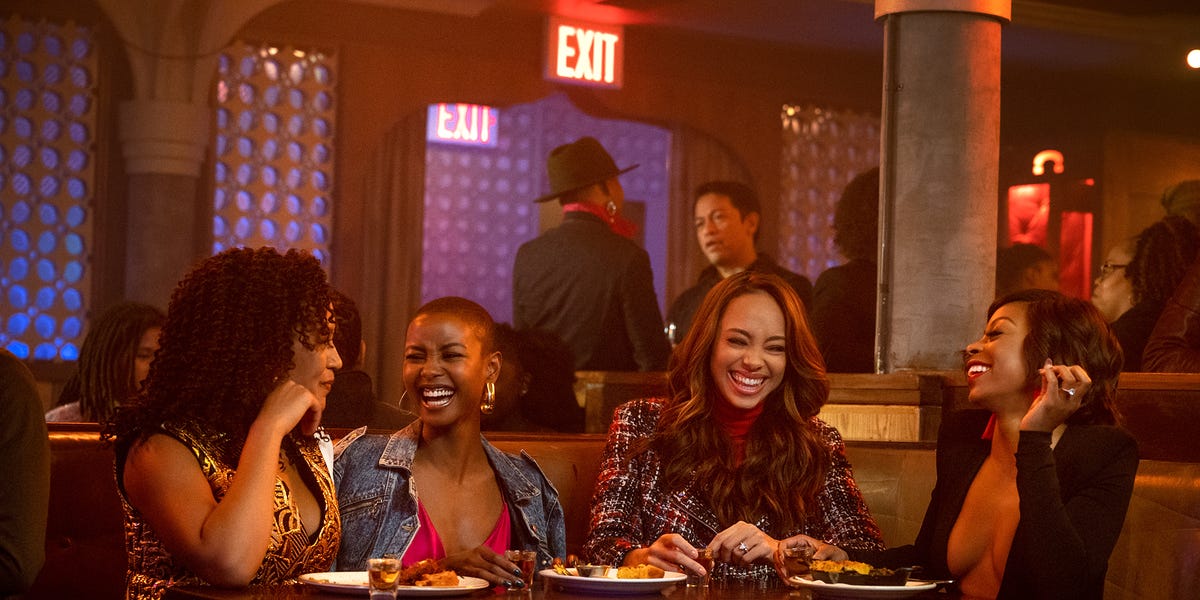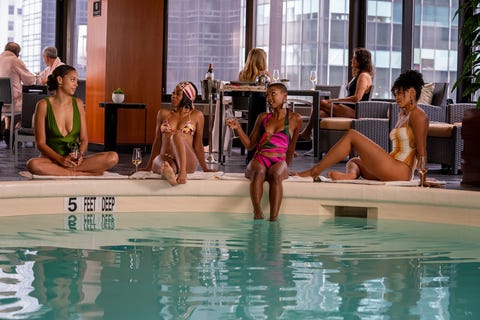I remember the first time I saw a white woman in a bodega above 125th street. It happened during the summer of 2013, when I was couch-crashing at a sorority sister’s apartment. The encounter, while memorable, did not end with me reciting Maya Angelou poetry, like Run the World’s Renee (Bresha Webb) in the series premiere.
Frustrated with a stranger’s disregard for her personal space while waiting for her bacon-egg-and-cheese, Renee complains to her friend, Ella (Andrea Bordeaux), that she is being “invisible woman-ed.” The phrase is a play on a concept from the legendary text, Invisible Man, authored by African American novelist Ralph Ellison. Renee understands that being unseen is about more than a white patron’s inattention to her environment on a hurried Monday morning. Like Ellison’s protagonist, she identifies the experience as demonstrative of racial politics that render marginalized people insignificant in the presence of those who refuse to see them. In other words, Renee is not important enough for the other shopper to acknowledge or offer the courtesy of an apology after she collides with Renee in her hunt for snacks.
Ella, to whom Renee recounts the incident over the phone, is not there to witness the bodega foul in person, but is no doubt familiar with the kind of friction that can occur when messy bun-adorned newcomers migrate to predominantly black neighborhoods. “This female colonizer in here was literally standing on top of me,” Renee says, to which Ella replies, “You know the whites can’t see us.”
Been there, felt that.
It is the simultaneous acknowledgement of and resistance to invisibility that makes Run the World an important cultural text in the tradition of Black representation and television’s attempts to make sense of—and capitalize on—feminism. Yes, this is a series about four girlfriends, all professionals in their early 30s, with equal doses of humor, affluent lifestyle candy, and messiness. But the expertly handled satire, signature YSL sandals, and sexually charged relationship antics combine to reveal a show that asks, and answers, what might fourth-wave feminism sound like if spoken in the language of urban, professional, millennial Black women?
While it will be hard for some to resist grouping Starz’s new series with Sex and the City or the more recent Girls, such comparisons ultimately undercut Run the World’s primary proclamation: that white femininity is not the axis upon which contemporary women’s empowerment turns. This new ensemble is not a chocolate-dipped replica of the HBO foursome that made cosmopolitan cocktails, Manolo Blahnik heels, and orgasms accessible parlance for a generation of teenage girls who tip-toed into Carrie Bradshaw’s New York City when our parents weren’t looking. Instead, the series projects a world that revolves around Black women and their culture.
Leigh Davenport, series creator and executive producer, and Yvette Lee Bowser, showrunner and executive producer, have constructed a moment in television that is aware of what came before without being beholden to it. In one episode, Ella refers to the ex-boyfriend she can’t seem to untether from her heart or bed as her Big. A more substantive nod is Erika Alexander’s casting as Barb, Ella’s boss at the fictional entertainment news website Hot Tea Digest. It’s impossible for me not to hear a more mature Maxine Shaw speaking in each of Barb’s scenes; that same alluring cynicism and wry wit that made Alexander’s ‘90s performance in Living Single remarkable is here in her portrayal of a middle-aged media executive in Run the World.
Despite these resonances, Ella, Renee, Sondi (Corbin Reid), and Whitney (Amber Stevens West) are more than derivatives that react to or seek to imitate their predecessors. The characters critique popular culture’s exhausted female formulas, like the overly cheerful mothers in commercials for antidepressants and “the successful black woman who has a closet full of Louboutins and can’t get a man.” Run the World pokes at these tropes but plays nicely with others; what we are left with is a kind of accessible feminism that need not constantly announce itself as feminism in order to be meaningful. The show is like peeking into a Black Girl Magic-themed brunch where women across a spectrum of woke-ness are seated around the table.
What makes this series so refreshing, nourishing even, is that it operates on the assumption that Black women are complex, multifaceted, and diverse in how we choose to navigate the world. That we do not think of ourselves exclusively as soldiers in a struggle for liberation, nor as choosing between race-consciousness or gender-consciousness. Each episode witnesses characters just as thoughtful about sexual agency, gender roles, and consumption as they are about colorism, gentrification, and microaggressions. Ella is the ingenue who quits her job to write her memoir and must turn to another Black woman for a second chance when the book tanks; Renee is the Wharton-educated marketing professional who intentionally opts out of motherhood after getting married; Whitney is the client-preferred lead on her firm’s big account; and Sondi is the self-assured parent figure demanding to be accommodated at her would-be stepdaughter’s ballet school. It is unsurprising that Davenport drew on her experiences as a 20-something writer in Harlem for inspiration. Her characters occupy roles that feel grounded in a particular reality, without being obsessed with Blackness as an original sin that must be overcome.
Since the 2010s have given us Insecure, Twenties, and Bigger—Run the World’s slightly older TV cousins—it’s easy to forget how tightly Hollywood usually clings to white femininity, especially in narratives about unconventional young women. When Black women show up on our screens, they still often exist in narrow ways: the sassy friend or assistant to the glamorous, white female lead; the forgettable sidekick who is Black in appearance only; the victimized and yet somehow invincible supporting character; the nameless cashier #1.
For many years, popular and scholarly discourses concerned with gender equity have looked to only the most visible female leads for models of defiance. As a result, popular feminism has become synonymous with the heroines of Wonder Woman (1975-1979), Cagney & Lacey (1981-1988), and Buffy the Vampire Slayer (1997-2003), to name a few legends. Each of these shows scripted characters that disrupted the status quo of their respective eras. Collectively, they asserted that women could be the center of their own entertaining narratives and that audiences desired to see women as something other than damsels, housewives, and sex objects. And yet, these progressive series left the color line undisturbed.
Run the World understands a fundamental truth that these earlier shows chose to disregard: Black women are not new to women’s empowerment. Although our contributions and our stories have largely been overlooked, we have been here all along, climbing and hustling. Just like Renee in that bodega scene, the series yells into the image universe: I am a woman, phenomenally. It is a communal declaration that Black women will neither be “invisible woman-ed,” nor satisfied with scraps of visibility. We intend to be seen, for all that we are, on our own terms.
This content is created and maintained by a third party, and imported onto this page to help users provide their email addresses. You may be able to find more information about this and similar content at piano.io

